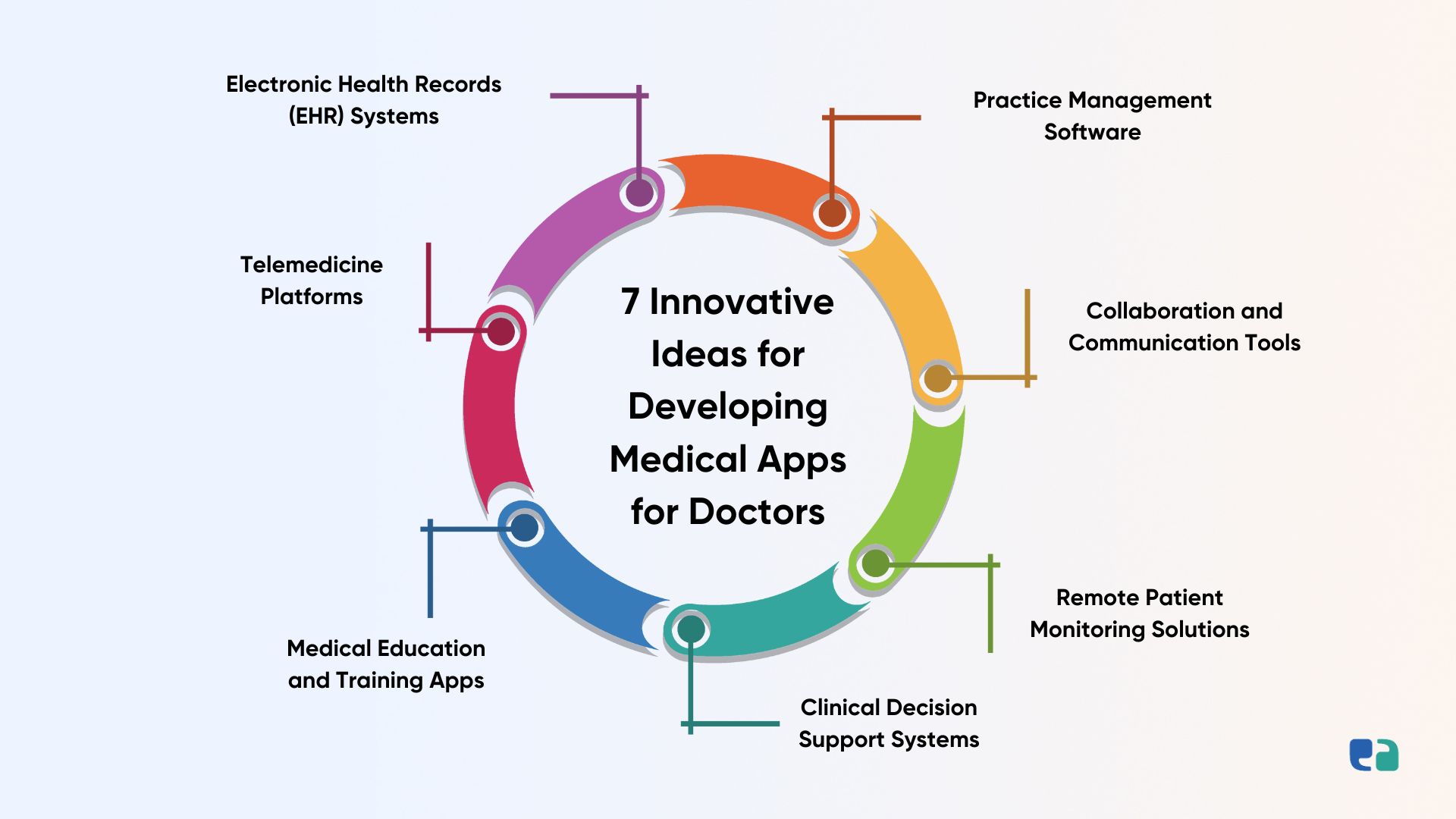7 Innovative Ideas for Developing Medical Apps for Doctors

9 months ago
It's no secret that technology has transformed how we live our lives.
From ordering groceries online to video-calling loved ones, we've come a long way.
And guess what?
The healthcare industry isn't far behind!
With the emergence of medical apps, doctors now have a whole new set of superpowers to enhance patient care, streamline workflows, and boost efficiency.
These apps are tailor-made for healthcare professionals, packing a punch with their versatile features that make complex tasks a breeze.
So, hold on tight and get ready to discover seven game-changing ideas for developing medical apps that are sure to impress doctors everywhere!

- Telemedicine Platforms
As we step into the era of remote consultations and virtual care, telemedicine platforms are becoming the go-to tools for healthcare providers.
With these apps, doctors can now conduct video consultations, diagnose patients remotely, and prescribe medications without leaving the comfort of their office or home.
By leveraging telemedicine technology, doctors can reach patients in underserved areas, provide access to care, and strengthen patient engagement.
Exciting times, right?
- Electronic Health Records (EHR) Systems
Can you imagine a world where doctors don't have to spend hours on documentation and can instead focus on providing quality care to patients?
Well, that world is here, thanks to Electronic Health Records (EHR) systems. EHR apps have revolutionized how medical information is stored, managed, and accessed.
They are user-friendly, easy to use, and tailored to doctors' needs.
With EHR apps, healthcare organizations can streamline documentation, facilitate real-time communication between care teams, and ensure seamless interoperability across different healthcare settings.
And that's not all, advanced features like voice recognition, predictive analytics, and mobile accessibility make EHR apps even more efficient and user-friendly.
So, if you want to enhance the way you manage your patient's medical records, EHR apps are the way to go!
- Clinical Decision Support Systems
Are you familiar with Clinical Decision Support Systems (CDSS)?
They are these amazing apps that use the power of artificial intelligence and machine learning algorithms to help doctors make informed clinical decisions.
These apps are designed to analyze patient data, medical literature, and best practice guidelines to provide personalized treatment recommendations, drug interaction alerts, and diagnostic assistance.
Imagine, with the help of CDSS, that doctors can improve diagnostic accuracy, reduce medical errors, and ultimately, improve patient outcomes.
It's safe to say that CDSS is changing the game when it comes to healthcare!
- Medical Education and Training Apps
Continuous medical education is vital for doctors to keep up with the latest advancements in their field.
Thanks to modern technology, medical education and training apps are making it easier than ever for doctors to enhance their knowledge and skills.
With interactive learning modules, virtual simulations, and case-based scenarios, these apps cover a wide range of medical specialties and topics.
Whether you're an undergraduate student or a seasoned professional seeking ongoing professional development, these apps have your back. So why not give them a try and take your medical education to the next level?
- Remote Patient Monitoring Solutions
Are you aware of the amazing benefits that Remote Patient Monitoring (RPM) solutions offer to both patients and doctors alike?
RPM apps allow doctors to keep a close eye on their patient's vital signs, symptoms, and adherence to treatment plans, all from the comfort of their own homes.
These apps use wearable devices, sensors, and mobile health technologies to collect real-time data and transmit it securely to healthcare providers.
By doing so, doctors can proactively manage chronic conditions, detect early warning signs of deterioration, and intervene promptly to prevent complications.
With RPM apps, patients can rest assured that they are receiving the best possible care, and doctors can easily monitor their patients' progress, ensuring that they stay on track with their treatment plans.
- Practice Management Software
As a medical professional, you know that running a practice can be quite challenging.
In addition to providing excellent care to your patients, you also have to juggle a myriad of administrative tasks, including scheduling appointments, managing patient records, and handling billing and invoicing.
But what if there was a way to simplify these processes and make your life easier?
Practice management software comes into the picture here!
With these powerful apps, you can streamline your practice, boost your efficiency, and enhance your profitability.
From appointment scheduling to electronic billing and financial reporting, practice management software has got you covered.
So why not take advantage of this game-changing technology and focus on what matters - providing top-notch care to your patients?
- Collaboration and Communication Tools
Today in the healthcare environment, effective communication and collaboration are crucial for providing top-notch patient care.
Fortunately, there are amazing tools available that can help healthcare professionals communicate better and work together more efficiently.
With these tools, doctors can easily share files, communicate securely, and coordinate care with their team members in real time.
By integrating these collaboration and communication tools into their daily workflow, healthcare professionals can focus on what matters: delivering the best possible care to their patients.
It's no secret that technology has revolutionized the world we live in, and the healthcare industry is no exception.
Medical apps designed specifically for doctors are changing the game, making it easier than ever before to provide top-notch healthcare services.
By using these innovative tools, doctors can streamline their workflows, improve efficiency, and ultimately enhance patient outcomes.
With endless possibilities for creating even more advanced medical apps.
